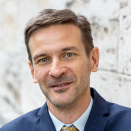Concluding our series on the continuous reorientation of Russian foreign policy away from Europe, this session focused on its increasing multi-vectorialization. This trend was strengthened by the current pandemic, domestic political developments including those concerning the new Russian constitution, and fresh conflicts in its neighborhood such as the war in Nagorno-Karabakh.
This session provided an early assessment of the current trajectory of Russia’s foreign policy and EU-Russia relations – not only as both Moscow and Berlin gear up for parliamentary elections in 2021, but also shortly after Russian opposition leader Alexei Navalny was arrested upon his return from Germany. We discussed how Russia’s experience with COVID-19 might have fostered the Kremlin’s “wait and see” attitude toward both foreign policy and relations with Europe, as well as how the new administration of US President Joe Biden can alter this outlook.
The final report of DGAP’s Strategy Group 2020 was also be presented at this event.
Opening remarks:
Manuel Sarrazin, MP
Spokesman for Eastern European Policy of the Alliance 90/the Greens’ Parliamentary Group, German Bundestag
Speakers:
András Rácz
Senior Research Fellow, DGAP
Liana Fix
Program Director, International Affairs, Körber-Stiftung
Michael Thumann
Foreign Policy Correspondent, Die Zeit
Chair:
Milan Nič
Head of the Robert Bosch Center for Central and Eastern Europe, Russia, and Central Asia


